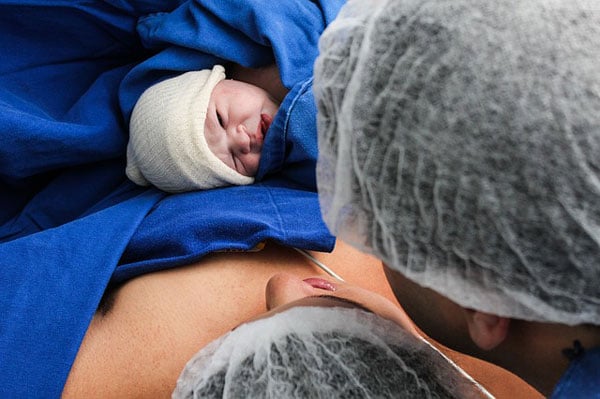Birth Plan – Can You Plan A Birth?
In Defense Of Birth Plans
“You can’t plan birth” is a phrase I’m sure you’ve come across if you’ve talked about birth plans. Maybe you’ve said it yourself. It really does seem like a common response to the idea of mothers having a birth plan.
And after years of talking about birth and birth plans I finally found the words to explain why that’s not really the case. Or more, why that’s not a reason not to have a birth plan – if you want one.
They’re not my words, but this article I read recently really did put it together in a way that I thought was really helpful, and highlighted why birth plans are important.
In this article titled “Don’t Throw The Birth Plan Out With The Bath Water” the key paragraph for me was:
Mothers report their birth plans are criticised or outright rejected on the basis that birth is “unpredictable”. There is no logic in this….There is a birth plan – one driven purely by care providers and hospital protocols without discussion with the woman.
While I agree you absolutely cannot plan the details of a birth in the sense of it’s timeline or how exactly your body will respond to labour. And while the route that your child’s birth takes may not be predictable, there are known scenarios that you can plan for. In the same way the hospital will have a plan. A plan that changes and adapts as labour progresses, or presents challenges.
And if the hospital can have a “birth plan”, then why can’t the mother who is giving birth?
Plan and Preferences
Another great term for a “birth plan” is “birth preferences”. Because that’s what most birth plans I’ve read really are. They are a way for mothers to effectively communicate with their care providers what their preferences are; especially if things do go wrong and perhaps in that moment they won’t be able to verbally express what they want to happen to their body and their baby.
My birth plan wasn’t a plan of the path I wanted my labour to take, it was list of preferences based on different scenarios.
For example my birth plan had things like:
- If I had another cesarean I wanted my baby to remain in the room with me the whole time (unless there is a medical emergency).
- If I had a vaginal birth I don’t want the cord to be cut for at least half an hour, or until I say so (unless there is a medical emergency).
- Basically If X happens I want Y (unless there is a medical emergency).
I also had things like: I don’t want to be offered pain relief. I am aware of what my options are, and I will ask for them if I need them, but I want to try to do it without them, so support me by not offering them.
And a few things that I felt should have gone without saying, but apparently did not with my first baby’s birth (which unfortunately ended up being a traumatic birth) – So I had put “Nobody is to touch me without my consent.” (Again “unless there is a medical emergency”.)
I also had a separate birth plan for my partner, that included little notes like; offer me food. If I’m struggling offer to help me change position. Things like that. Mostly just reminders of what we had discussed during my pregnancy, because I understand in the birthing suite sometimes it’s a little hard to remember anything that was said in the outside world.
An Unfortunate Necessity For Some
In an ideal world birth plans would be redundant. Because ideally these conversations would have already taken place weeks, possibly months, before the birth of their baby. If you see the same care provider for every appointment in the lead up to giving birth and then have that same person care for you in labour – then they quite likely already know all of your preferences. You’ll have already had ample opportunity to discuss all of your options.
But for someone like myself – that wasn’t an option. I had never met the midwives who were with me in labour. We had no history. And as far as I know they had no record of what I had previously discussed with the half dozen or so midwives I’d already seen throughout my pregnancy.
Having a plan in writing made communicating what I did and didn’t want a little easier, given that I was in fully active labour when I first met the midwife.
That said not everyone needs a birth plan. A birth plan is like any other birthing tool or option; what’s right and what works for one person, might be completely different for another. If you want a birth plan – have a birth plan! If you don’t, then don’t. It’s that simple.
Discuss Your Birth Plan With Medical Professional(s)
Even if they’re not necessarily going to be the person who is with you when you give birth, discuss your birth plan with them. I talked about my options and expectations with every single midwife I encountered during my pregnancy. That way I got as much information as possible about what the policies and procedures within the hospital were. Because again – they already have a birth plan in place. Find out what their “birth plan” is and how flexible are they? What are you options? What can’t they do? And why? Then you can make choices based on what you believe is best for you and your baby.
More Than Just A Piece Of Paper
Just writing my birth plan was an empowering experience for me. As I’d mentioned my son’s birth was traumatic and most of that trauma came from the fact that a lot of things that were done to me I either didn’t consent to, or didn’t understand. I wasn’t given a lot of information about what was happening – and why. And also I had the obstetrician perform a stretch and sweep without consent. So when things went wrong and I needed an emergency section I was already terrified, and already didn’t trust my care providers. Which all contributed to a traumatic birth experience.
So writing a birth plan felt like I was taking back my body. It felt like reclaiming the informed consent that was missing with my first child’s birth. Which is really the biggest part of why having a birth plan was important to me.
If you have given birth and you feel you are unhappy or traumatised by the birth I highly recommend Birthtalk.org for support and information. Also PANDA have some great resources.




I never had a birth plan with either. And things happened both times that were beyond my control so I always went in thinking “let’s get the baby out safely”. And thankfully that’s what I got both times.
I think having a plan is a great way to empower and educate yourself about your choices. Yes, it must be flexible of course, but it’s a wonderful thing to do for yourself.
I had nothing really… I was at ease with whatever happened
Just a dot point plan with things I wanted/didn’t want.
E.g. delayed cord clamping, use of the shower, no epidural etc
I got the drug free, relaxed births i mostly wanted both times, even though I was induced with both.
That’s very similar to what mine had.
I had one but it all went out the window!
I didn’t, I wish I did though because I know what you mean about taking back some of the autonomy. With my first I went in so clueless, trusting doctors and nurses to do the right thing and guide me and it did not turn out great. I felt so unprepared
I had a birth plan with both and both were amazing births.
I didn’t have a plan as such. I was told I’d have to have a Caesar with both of my kids due to scarring. But that was ok by me, I was so happy to have my babies healthy I wouldn’t have cared if they’d arrived in a taxi x
I had a bit of a guide, and I just made sure my husband knew what my preferences were! I think I had it written down somewhere though..?
For my second born I was attempting a VBAC and I created a visual birth plan! So empowering and I felt sonin control ?? I achieved it btw ??
No I don’t believe in them. Just get the baby out safely. That’s all I care about.
Me too, absolutely.
I cared about birth plans before the birth of my first, when I was concerned about things like pooing myself during labor.
Then with my first, I was told at 25ish weeks that he was breech and to do exercises. At 34 weeks I was struggling to walk 2 streets to meet hubby after work and went on maternity leave.
A few days later, I was up all night with a persistent need to pee and went to hospital the next mornjng for monitoring.
Was almost sent home from hospital overnight, but bubs heartbeat was just a little too slow, and they decided to do a c section.
They had to cut twice to make it wide enough to get bubs out. He was 11 pounds due to an undetected haemangioma on his liver – 11 cms big.
He passed 2 hrs after birth.
That’s when I learnt that how bubs arrived was less relevant than having an alive bubs after delivery. Not by much – some women are terribly scarred and have trouble concieving after, some have continence issues, some have period issues – there is an entire lack of transparency when it comes to the issues women can be left living with as a result of pregnancy – and a lack of priority, empathy, and urgency to dealing with these issues.
But, what music is played during childbirth, the ambience of a room, even what drugs are administered – these things seemed important to me, until I lived the reality of leaving a hospital without a baby.
Oh I’m so sorry. How devastating! Yes none of these things are important. Yes you need to feel safe and heard but everything else is about the baby.
No plan for me but I think every mum-to-be deserves to do whatever makes them feel comfortable, confident and as ready as they will ever be ?
I was more clear second time around than first!